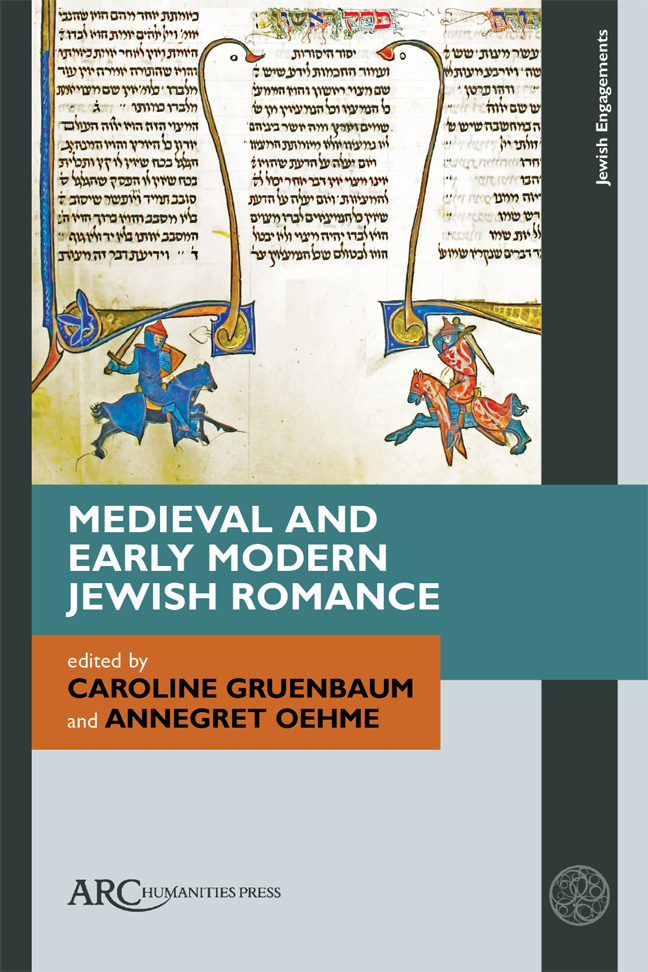Book contents
- Frontmatter
- Dedication
- Contents
- List of Illustrations
- Acknowledgements
- Introduction
- The Zohar as Medieval Jewish Romance
- Letters of Loathing: Immanuel of Rome and Romance Epistolary
- Illuminated Knights and Tales of Romance in the Rothschild Miscellany
- The Queen Nudatio: A Romanesque (?) Topos in Israel Caslari's Roman d’Esther
- At the Court of the Demon King: The Story of the Jerusalemite and Chivalric Romance
- Melekh Artus as a Jewish Romance: Horizons of Expectation and Genre Configurations
- A Friend in Need is a Friend Indeed?Friendship, Love, and Loyalty in the Yiddish Seven Sages of Rome
- Stealing Back One's Husband: The Yiddish Mayse mi-Danzek in the Context of Early Modern German Cross-Dressing Narratives
- Romance Elements in Meshal Haqadmoni by Isaac Ibn Sahula: A New Reading
- Afterword: Jewish Romance in Search of Identity
- Select Bibliography
- Index
At the Court of the Demon King: The Story of the Jerusalemite and Chivalric Romance
Published online by Cambridge University Press: 18 February 2024
- Frontmatter
- Dedication
- Contents
- List of Illustrations
- Acknowledgements
- Introduction
- The Zohar as Medieval Jewish Romance
- Letters of Loathing: Immanuel of Rome and Romance Epistolary
- Illuminated Knights and Tales of Romance in the Rothschild Miscellany
- The Queen Nudatio: A Romanesque (?) Topos in Israel Caslari's Roman d’Esther
- At the Court of the Demon King: The Story of the Jerusalemite and Chivalric Romance
- Melekh Artus as a Jewish Romance: Horizons of Expectation and Genre Configurations
- A Friend in Need is a Friend Indeed?Friendship, Love, and Loyalty in the Yiddish Seven Sages of Rome
- Stealing Back One's Husband: The Yiddish Mayse mi-Danzek in the Context of Early Modern German Cross-Dressing Narratives
- Romance Elements in Meshal Haqadmoni by Isaac Ibn Sahula: A New Reading
- Afterword: Jewish Romance in Search of Identity
- Select Bibliography
- Index
Summary
THE STORY OF a Jewish man who accidentally ends up in a town full of demons, and marries one of them, might not at first seem to be related to medieval chivalric romance. I argue in this chapter, however, that some of the versions of this story show distinct ties to this prolific literary genre. The narrative, which I will refer to as The Story of the Jerusalemite (and henceforth as The Story), tells of the misadventures of a Jewish man who breaks his oath to his father and finds himself exiled in a village of demonic beings (shedim). This legend likely emerges in the East, and shows marked Arabic or Islamic influences, which could and should be part of a discussion of its interculturality. For the purposes of this chapter, however, I focus specifically on its circulation among Ashkenazi Jews and posit that they received The Story in the context of the chivalric romance tradition. Further, reading this text through its chivalric connection not only allows us to say more about the text itself, but also evokes a wider scholarly and pedagogical frame, creating space for The Story to enter a broader literary tradition. And this move is not one-sided: it allows us to use this story to engage with some of the theoretical questions of the literary tradition; for example, how do we define medieval romance? This is an unexpectedly difficult question, and there is no scholarly consensus on an answer. My goal in is not to provide an answer, but to show how The Story can relate to this question.
As is frequent with medieval stories, particularly ones that have one foot in popular folk traditions, there are many analogues of The Story. There are many questions about its precise name, date of composition, language of origin, and place in Jewish tradition. The version that most clearly has affinity to chivalric romance traditions is preserved only in early print versions. While we have no extant witness of the story in this exact form in a medieval manuscript source, enough of the elements are found in different analogues to strongly suggest that it is medieval in origin, and scholarship to date has treated it as medieval. We can tentatively date it to before the thirteenth century.
- Type
- Chapter
- Information
- Medieval and Early Modern Jewish Romance , pp. 95 - 106Publisher: Amsterdam University PressPrint publication year: 2023



